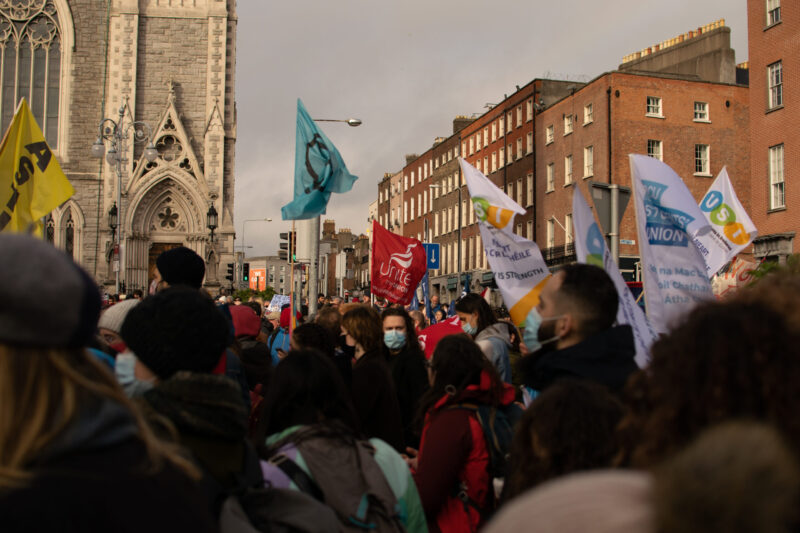At tonight’s Union of Students’ in Ireland (USI) executive election hustings, poor student engagement was the unavoidable topic of discussion. As Students4Change Chairperson László Molnárfi put it in a question during the event: “The only people here are the candidates, sabbats and the press.” With a total of 13 people in attendance as well as a maximum of seven watching live on Facebook, candidates’ policies on engagement were put in stark contrast to the picture within the Thomas Davis lecture theatre.
However, sole presidential candidate Beth O’Reilly made a strong showing, flexing their union experience and promising to bring a more “radical, activist” strategy to USI’s campaigns and government interaction.
Another strong candidate was current NUI Galway Students’ Union (NUIGSU) President Róisín Nic Lochlainn who is running unopposed for the Leas-Uachtarán don Gaeilge. Calling for USI to study Trinity and NUI Galway’s success in fostering Irish-speaking communities, Nic Lochlainn argued that further integration between the local and national union strategies could lead to additional progress. She concluded: “Our language isn’t something to be taken for granted.”
Engagement
At the poorly attended event, the issue of student engagement was brought up again and again in candidates’ speeches. O’Reilly recognised the difficulties that USI has with engaging students, as evidenced by the in-person attendance of only 13 students. She proposed a range of solutions including the establishment of equality focus groups and regional student activist networks. However, O’Reilly had little in the way of explaining why students would engage with these proposals if they fail to engage with existing channels.
In terms of engaging with the government, O’Reilly’s plans strike a balance between being oppositional while recognising that she would need to work with the government. They seem, however, more naturally inclined to a more antagonistic relationship with the government, remarking that “the angle that I am coming from is not one that would particularly want to shake hands with Simon Harris”.
Naturally both candidates for Vice President for Campaigns emphasised the importance of student engagement. Ross Boyd offered a plan to re-engage students by “relating national issues to local issues”. He also advocated for USI to reach out to students that have not traditionally been involved with students’ unions and ensure that the USI’s campaigns are intersectional and representative of all students.
Liam Cosgrove had a more national focus, invoking major student movements in Ireland and abroad, such as the Tiananmen Square protests in China and Ireland’s marriage-equality movement. “We can be at the forefront of societal issues again”, he said. Cosgrove provided more examples of concrete steps that could be taken to increase student engagement than Boyd, proposing the creation of the Irish Student podcast and a website to provide students with information on upcoming protests and how they can get involved in lobbying.
John Fortune, the sole candidate for Vice-President for Equality and Citizenship, offered a more expansive vision of engagement suggesting that USI should organise competitions between students’ unions encouraging them to register students to vote.
Higher Education Funding
Discussion of the underfunding of higher education was notably absent from most of the night, with presidential candidate O’Reilly the only one to give major detail on her plans to lobby for better funding.
Stressing the need for USI to maintain pressure on the government to release and act on the long-awaited Cassells Report on higher education funding, O’Relly said: “Publicly funded education cannot come at the cost of underfunding the sector.”
O’Reilly added that their approach to fighting fee increases and the treatment of international students as “cash cows” would centre on the central issue of underfunding within third-level.
Student Representation and USI Democracy
Candidates for Vice President for Campaigns diverged from this year’s union policy when asked whether USI should have supported the #NoInPersonExams campaign.
Boyd, of Dublin City University Students’ Union (DCUSU), took a measured approach, arguing that while it was a mistake not to support the petition, the union required a student mandate. “It’s very much about what students say to us”, he said.
Cosgrove from Maynooth Students’ Union (MSU) went further, saying that “as a member of a union who had to fight tooth and nail [for online exams], it would really have helped to have that national leadership”.
Cosgrove argued that USI democracy requires elected representatives to “lead the change”, saying he prefers an “ask forgiveness, not permission” strategy over the current system requiring student mandates for USI action.
In the presidential race, O’Reilly displayed the institutional knowledge she has gained as the USI’s Vice President for Campaigns when asked whether she would support extending the vote to all students in USI elections, saying that it is something that she would be happy to examine as part of the USI’s constitutional review but recognised that the USI cannot act unilaterally on this issue as “there’s issues with trilateral agreement” with the Northern Irish and British national representative bodies for students’ unions.
Next year’s USI executive will be elected at the union’s annual congress, which is taking place in Trim, Co. Meath, next month.







